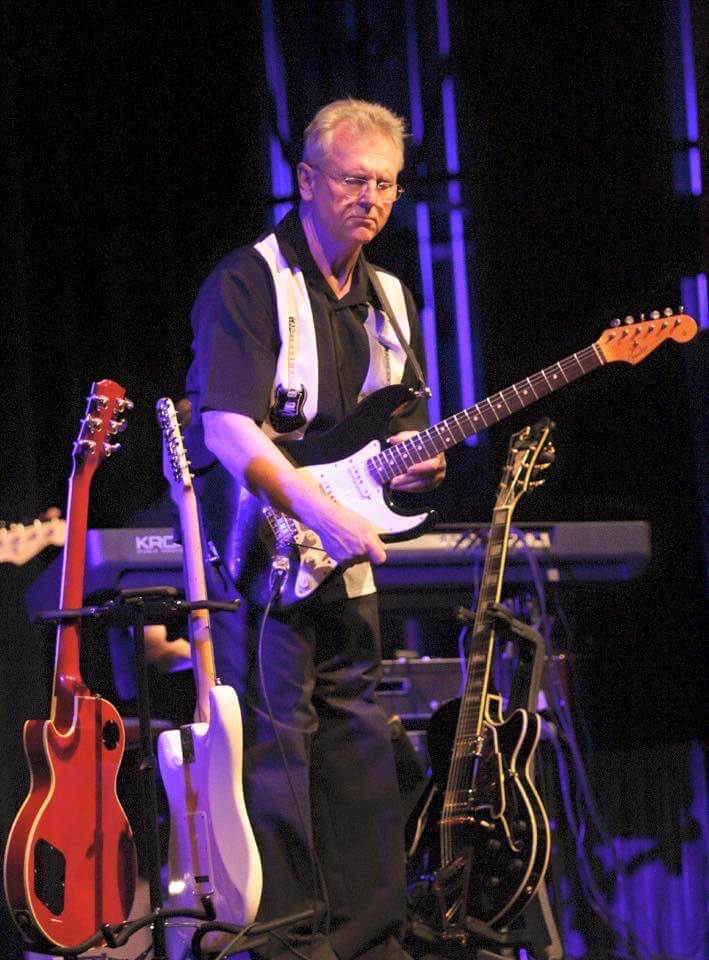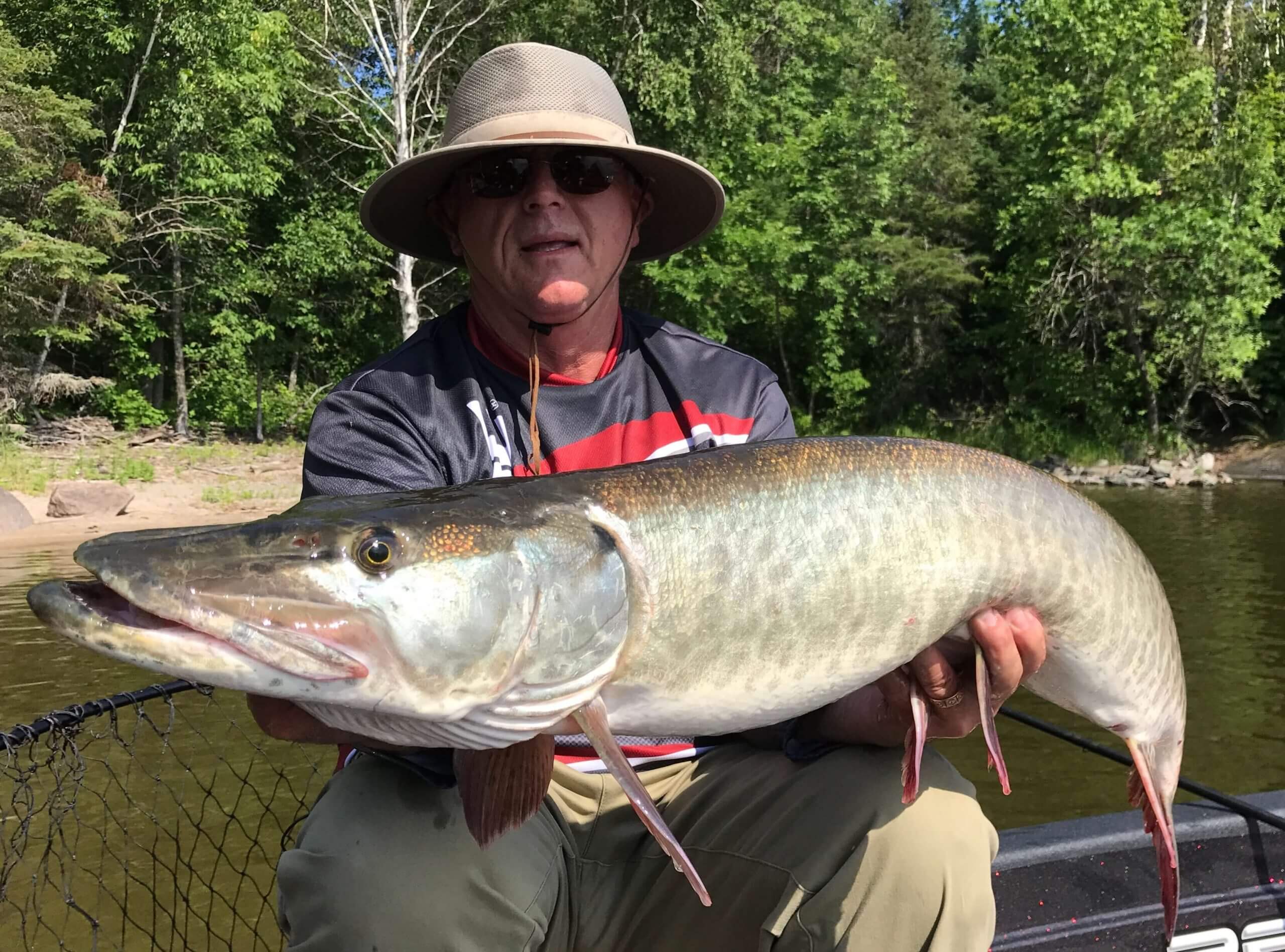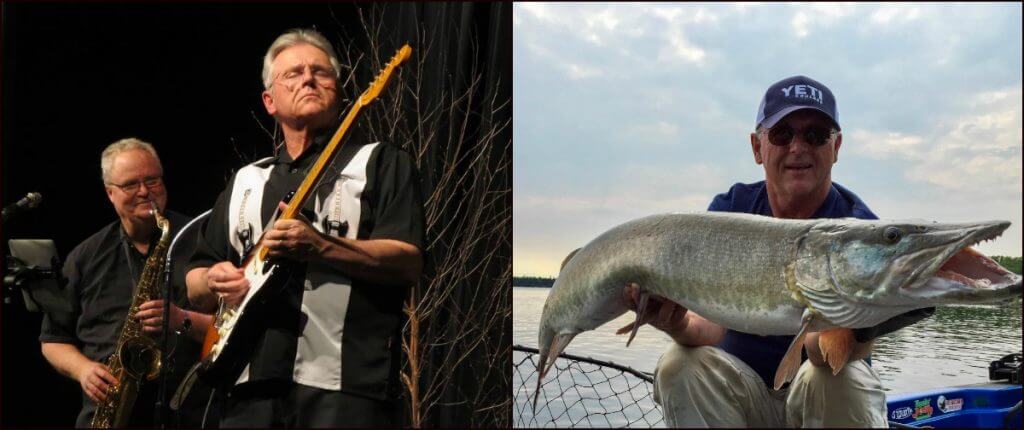Legendary Freshwater Fishing Hall of Fame angler Joe Bucher is most widely noted today as a musky guru. His beginnings are deeply rooted in bass fishing. In fact, during his boyhood years he was locally known as a “Teenage Bassin’ Wiz”. Throughout the 1970s, ’80s, and ’90s he was a full-time walleye guide and took clients on frequent musky trips.
A prolific writer, Joe has authored six books and has contributed writings for many regional and national publications on a wide variety of hunting and fishing topics. His articles regularly appear in the pages of Outdoor News publications as well as Musky Hunter Magazine, which he founded. He has been a writer for over 35 years and published his first article when he was just 19 years old. He has pioneered many of the musky angling concepts that are now considered mainstream techniques, and he founded Musky Hunter Magazine in the 1980s.
Bucher is one of the most highly sought after seminar orators for big game fish in the country drawing crowds of fans and hardcore anglers anxious to learn more from a true master. He also writes, produces, and plays his own music instrumentals for his TV series, Fishing With Joe Bucher.

Brant Buckley:
How did you get into music?
Joe Bucher:
A lot of us growing up as kids listened to the radio. No matter what generation you are from you get motivated. For me it was all about The Beatles. I am now in my mid-sixties and I bought all of their records when I was young and I wanted to play like John Lennon and George Harrison. That is where I started. I talked my dad into getting me my first guitar and I started learning Beatles tunes. I was around twelve or thirteen years old. That’s how I started.
Who are your favorite Blues artists?
It’s funny because I was always playing Blues. As I became a more seasoned guitar player, I realized I was playing Blues licks. I was into Clapton, Hendrix, and Jimmy Page. I was into the basic 1960s and 70s Rock which is a Blues based thing. We now know that The Beatles and Stones played some Blues.
Years later, I was guiding a couple of rock stars from the band Survivor. The guitar player Frankie Sullivan was in the boat and Jim Peterik. They wrote ‘Eye of The Tiger.’ They love to fish and this was back when I was still guiding. They started talking guitars. They knew me as a fisherman and they didn’t know anything about my guitar playing. They were talking about Stratocasters and model numbers. I chimed in and they asked what I knew about guitars. I told them I used to play and they were going yea right. They were kidding around with me and told me I must be a hack guitar player. Those guys are funny and full of humor and they were digging into me so I had to dig back otherwise it was going to be a long day.
Long and the short of it, after a day of fishing I dropped them off and Frankie Sullivan said, ‘Come on in here Joe. I want to see what you can do.’ I told him I had not played guitar in fifteen years. He had a place in Eagle River, Wisconsin. I walked downstairs and Frankie was wailing and my camera man followed me and was filming. I felt like I was going to be completely embarrassed. Frankie handed me the guitar and I played a little Eddie Van Halen two handed tapping technique. There were many expletives and he said to everyone in the room, ‘This guy can actually play!’ I was as rusty as could be.
We were sitting around afterwards having a brew and he told me I am a Blues player. He told me everything I play is Blues based. He really identified me as a Blues player. I asked myself, If I am a Blues player who are my influences. Clapton and Hendrix are Blues players. ‘Red House’ is a Blues tune. I started walking back and educating myself. Stevie Ray is Stevie Ray but Albert King sounds an awful lot like Stevie Ray. Everyone thinks it’s a Stevie Ray lick but really it’s an Albert King lick. I started getting into B.B. King too. I studied the electric Blues players including T-Bone Walker. I love all those guys and I play and listen to them all the time. Also, there’s Buddy Guy. Those guys didn’t even have the electronics that the generation after them had and they still did a wonderful job. Zeppelin was super Bluesy. I didn’t know it was Blues. I am crazy about Albert Collins, Albert King and T-Bone Walker. A lot of people today don’t know who the Blues players are. I think Jimmy Thackery is an amazing player. The guy can literally play anything. He’s just awesome.
What I love about Blues guitar is that it’s so spontaneous and emotional. It is so touch and feel based. Instead of taking a note from one place and touching the next note like most Jazz players do, the Blues player bends it there. It is what makes players so unique. When Rock guys have the Blues influence or background even when they don’t know they do, their playing is so emotional and good. I think that’s what makes Carlos Santana and Neal Schon; the way they can bend strings.
Does fishing influence your songwriting?
I have actually written a lot of Blues based music and mood based music for my T.V. show. All the music from my T.V. series is mine. When I film an episode, I see and feel mood style Blues. There are times when high energy Rock stuff is the way to go. When you slip into a quiet bay with wildlife there’s a Blues Fusion sound to it. It is like a slow Blues and I can write that all day. I have connected with a fisherman in Nashville named Steven Paul who does all of my drum, bass and keyboard parts. We connected through fishing and became fishing friends. It was through musky fishing in particular. He told me if I ever needed background tracks he could do them for me. He plays on a lot of records and most people don’t even know who he is. He’s the backing track guy for all of my music.
Here’s how the T.V. end of it goes. It goes back to fishing with Frankie Sullivan of Survivor. He told me to get into the studio with a few of my friends. Instead of getting rights to backing tracks, he encouraged me to write my own music. In the T.V. business it’s just as bad as the radio business. BMI and ASCAP monitor what music you use underneath your T.V. series. He told me I should do my own thing to get my own signature. I produced a few pieces with Frankie. It became the signature of our show. People wanted to know where the music was coming from.
I eventually started playing live with a group and showcasing some of the music. What ends up happening is this. Steven Paul my friend from Nashville will send me backing tracks. I build from it and that is how a lot of it happens. Sometimes I will tell him specifically what I need. For example, I may need a minor Blues slow tempo track. I will play something very rough and I will send him a recording from my cell phone. He works with it and in a couple of hours gives me something back. With modern day computers you can plug into Garageband, find an amp and effect and plug your guitar in and start playing. I realize when and where it’s going to work in a particular part of my show. I build a library of material and my editor drops things in until we find something that really works. We end up building the edits within the T.V. show around the music.
For example, I may say on the show, ‘Hey folks today we are on the Mississippi River. We are fishing largemouth in the backwaters and these are the lures we are going to use. Stick around for the action.’ We will build the opening music with a bass track and something soft and when that transition happens we transition to guitars and build momentum and excitement. We keep working the scene until it works with the transition of the music. The music ends up being a particularly important part of the show from our perspective. A lot of people don’t see it but musicians will notice it. It’s fun because it takes it to another dimension. Instead of saying we need a five second transition, we may film a scene of an eagle or heron taking off. We then have a music piece that is eleven seconds and we carry the scene or sometimes even slow mo it. We may even get a drone shot. We shoot long enough so the music works. It’s a creative nature and my editor is really the guy.

For people who are new to musky fishing what do they need to know and where should they start?
Musky fishing is the ultimate challenge. This fall I am over on the Mississippi in western Wisconsin where there aren’t musky. I am bass, pike, and walleye fishing. When you go out for these fish you expect to catch numbers of fish and locate schools. When you are musky fishing you are hunting for one fish. They are harder to catch, find and trigger. They are bigger and stronger. Readers who are already anglers that want to take their fishing in a whole other direction; in the freshwater game it’s musky fishing. Now all over North America, if you can believe it, there are muskies even where there weren’t muskies fifteen years ago there now are.
Muskies are a very unique fish. It is physically a lot of work and it is a mental drain. It’s a mental challenge and a mental strain to keep yourself active and in the game and do all the right things. It is very much like the unappreciated bass player and drummer. You have to do everything right and stay in time and rhythm with muskies because you never know when you are going to get that one opportunity. You usually get one opportunity on any given day. Some days you may not. On a really good day you might get a few. You are only going to get a couple shots. It is well worth it because it is the ultimate freshwater experience to catch a real big musky.
I ended up specializing in muskies later in my career. Musky fishing is the ultimate challenge and if you are going to go after them you need to outfit yourself correctly and learn the game. Learning the game means watching videos and reading. You have to realize when you put the boat in the water you are not out there to catch a bunch of fish, you are out there to do everything you can to have one opportunity. We have a musky app called Musky 360. My buddy from Nashville Steven Paul runs and edits the app.
Is there a musky bait or brand that equates to the Fender or Gibson brand in the guitar world?
I am biased because I have my own brand. I started the Bucher brand by accident when I was guiding. I started hand making baits because I wanted them made a little different from a durability and functionality standpoint. I started making my own spinners called the BucherTail. One of my clients named the bait. One of my clients caught a big musky and it was on display. That was back when you kept muskies. The local sport shop guy wanted me to display the lure in town and called it a BucherTail. He wanted me to have lures to sell. I could make one but to make ten or one hundred seemed like a lot.
My wife and I put $200 on the credit card and bought some materials and started Joe Bucher tackle company. We are one of the largest if not the largest musky lure manufacturers in the world. Now we make crankbaits and topwater lures. There’s the DepthRaider, ShallowRaider, The BucherTail, and Slopmaster Spinner Baits. We have this entire line of products and all of those lures were built as tools for a certain situation. I built an entire family of lures. I think my company is very much like a Fender. It’s like a Strat which is a working mans guitar. It’s a Telecaster. I love Telecasters and Strats. I have a Gibson ES-335 and Les Pauls and they are wonderful guitars. DepthRaiders, ShallowRaiders, and BucherTails are very Fenderish.
Can you talk about your biggest musky and how many muskies have you caught?
That’s interesting because over time I never really counted all of them. Back when I was guiding, I averaged over two hundred fish per year. I guided for twenty-six years. I have caught thousands of muskies. The benchmark of a big musky today is fifty inches. I have caught hundreds over fifty inches. I don’t say any of these things to brag. It’s part of the history of what happened.
Years ago, we kept the muskies. All of the world records were established by weight. There was a transition to catch and release not only in musky fishing but in fishing in general. The Fishing Hall of Fame and World Record Keepers made a class of catch and release world records. The catch and release records were all by length. Today it is all about length.
My longest musky is fifty-seven inches. My heaviest musky was shorter, but it was a fall fish. Depending on the time of year when you catch them the weight fluctuates. If you catch them right after they spawn, they are at their thinnest. In late fall and early winter the fish are heavy and fat. The fifty-seven-inch fish I caught wasn’t overly heavy but it had a head like a big alligator. Literally you could put a basketball down its mouth. Fish that big are dangerous and scary to handle because they are so powerful and strong. That fish tore my shoulder up. It took me years to recover from that shoulder injury from lifting and handling that fish for a photograph.
In the musky fishing world, I think that every musky is special because they are so hard to catch and they are precious fish. The big ones are special. I caught my biggest northern pike last week. It was musky sized and around forty-five inches long. My wife was fishing with me and thought it was a musky. Big fish of any caliber are really special. Fishing is such a therapeutic thing. Fishing and the mood of Blues can be put together. Even on your worst days if you can get out on the water it soothes the soul so to speak.
What else do you want to accomplish?
I am so fortunate to have the career that I have had. The fishing world has been so good to me and putting my music into television has been such a wonderful thing. If I die tomorrow, I can die a happy man because God has blessed me with health, some great friends and the ability to play music and go fishing. I am a pretty lucky guy.
With the rest of my life, I want to help others. I put on a big Blues festival in northern Wisconsin every July. Twenty-one years ago, I created the biggest music event in northern Wisconsin. It is a Blues festival and Blues artists from all over the tri-state area come up and it’s totally nonprofit. We raise funds for scholarships and fund youth sports programs. We purchase musical equipment for the high schools and the grade schools. It has become a huge event. It’s a Bluesfest, Barbecue Fest, and there are silent auctions. We have three things going on and all the money goes to the community for kids.
All the volunteers are parents, teachers, and coaches. We make sure the musicians are paid. I created this because I wanted to do something different. I love Blues and I wanted to introduce the northern Wisconsin audience to Blues. Within five years we developed one heck of a great festival. I have a list of groups that cannot wait to play. We have competition barbecue teams that come up and cook food. You will eat well and listen to great music. At the end of the night we cut a check and give it to the community. It is closely monitored and I don’t make a penny. I donate heavily.
All the people that I am involved with in the fishing business donate to the silent auctions. All veterans and law enforcement get in free. We feed them and treat them with the utmost respect which they deserve. It ends up being one heck of a weekend and we have a blast doing it. It is always the last Saturday in July. We have a Facebook Page for the event.
Joe Bucher Outdoors
*Feature image photos by Tim Gaffney (L) and Chas Martin (R)


